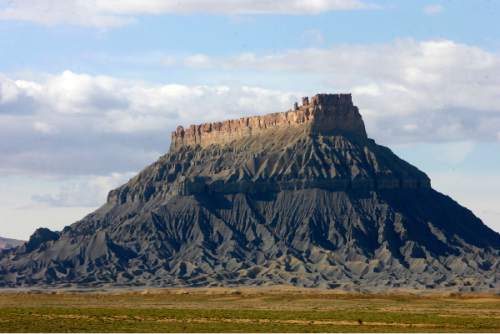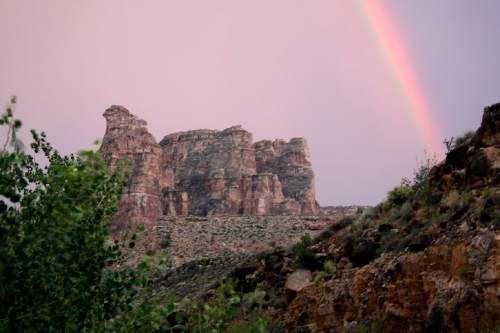This is an archived article that was published on sltrib.com in 2016, and information in the article may be outdated. It is provided only for personal research purposes and may not be reprinted.
A draft of Utah's lawsuit demanding the federal government turn over 30 million acres to the state is expected to be complete by next week, but Democrats on the commission overseeing the project still want to know more about how $1 million in taxpayer dollars have been spent.
Rep. Keven Stratton, R-Orem, co-chairman of the Commission for the Stewardship of Public Lands, said he plans to have a finished draft of the state's potential lawsuit to present to lawmakers when they hold their monthly meetings June 15.
It would be up to Attorney General Sean Reyes and Gov. Gary Herbert to decide whether to file the complaint, committing the state to litigation with a projected price tag of $14 million.
But Sen. Jim Dabakis, one of two Democrats on the commission, wants to know more about how the commission is spending taxpayer dollars. Specifically, Dabakis, D-Salt Lake City, has sent letters to Stratton and Sen. David Hinkins, R-Orangeville, the other co-chairman of the commission, demanding to know details of $341,513 in expenditures listed on invoices as public-relations work.
Dabakis said he suspects that the commission might be spending the money to run a PR campaign opposing the creation of the proposed 1.9 million-acre Bears Ears National Monument in southeastern Utah.
"I don't know because they won't let me see. They're spending that much money and they say, 'consultation.' What does that even mean?" Dabakis asked. "They cannot be lobbying with this money. Where is it going?"
Stratton wouldn't say exactly what the money was spent on — only that it would be clear when the work is presented to his colleagues next week. The actual complaint will not be released until Reyes and Herbert decide whether to file it.
Generally, he said, the consulting firms did work supporting the Davillier Group, the Louisiana-based law firm hired to prepare the complaint. If attorneys had done the nonlegal work, it would have cost the state much more, Stratton said.
According to a listing of payments made by the committee, Strata, a policy institute that operates in collaboration with Utah State University, had been paid $129,409 through May 2 for "graphics," "audio video," "pr writing" and "case development."
The Davillier Group also reported paying $212,104 to Nuffer Smith Tucker Public Relations out of San Francisco for "Relations Services."
Earlier invoices also had showed payments to Foxley & Pignanelli, a prominent Salt Lake City lobbying firm, for public-relations work on the project.
In total, the commission has spent more than $900,000 for a legal analysis of the argument that Utah is entitled to claim ownership of federal lands in the state and for the drafting of the complaint. Stratton said the commission budgeted $2 million for the work and managed to come in well under budget.
"Frankly, we've been very pleased we've been able to hold the costs to where they are," Stratton said. "Some would say, 'Are you kidding me?' But we need to put it in perspective of what we're dealing with and what is at stake, so the state's interests are protected and the attorney general and the governor have the best information possible to move forward."
The legal analysis by the Davillier Group said there is a legitimate case to be made that Utah should be entitled to ownership of federal land within the state's borders because Congress said it would dispose of the land and has turned over tens of millions of acres in states east of the Rocky Mountains to state governments and private landowners.
Other legal analyses, such as one done by professors at the University of Utah, have concluded that Utah has no legal right to demand ownership of the land, and Utah and other Western states disavowed any claims to the federal holdings when they were granted statehood.
Dabakis had previously asked for any legal analysis of the weaknesses of the state's claim, but he was told that it was subject to attorney-client privilege and the lawyers technically work for the chairmen of the committee, not the entire committee.
"This just should not be acceptable in an open society," Dabakis said. "You should not be able to spend hundreds of thousands of dollars of state money and then be able to cover it all up. … It just isn't right, and it ought to stop."
Twitter: @RobertGehrke







